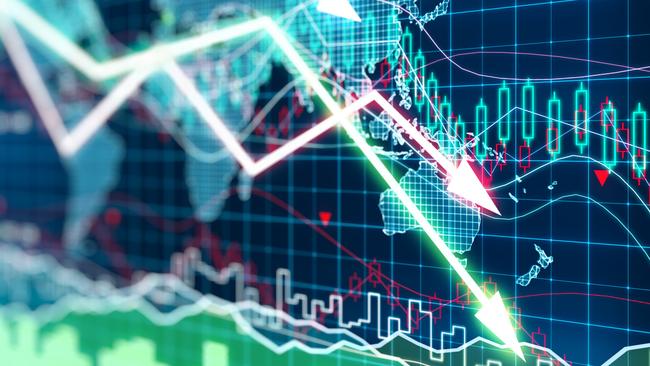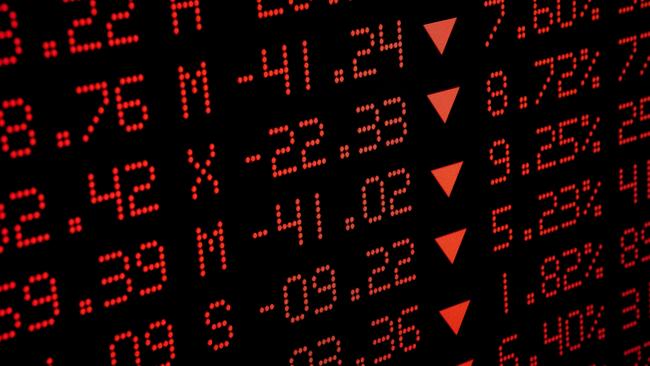Why you should care about ASX bloodbath even if you don’t own shares
It has been a horror week for the Australian stock market – and there are glaring reasons why we should all be concerned by the crash.
Markets
Don't miss out on the headlines from Markets. Followed categories will be added to My News.
Australia’s stock market has plummeted this week, with a staggering $116 billion wipe-out sending shockwaves across the nation on Tuesday.
There were falls again on Wednesday, with the market dropping 0.4 per cent in the first hour of trading, and concerns are growing there will be more pain on the way today.
AMP Capital chief economist Dr Shane Oliver told news.com.au Australia was going through a market correction that had been brewing for months, with the volatility driven by fears soaring inflation and rising interest rates in the US could spark a recession which would have global repercussions.
“That’s weighing on our markets at the same time as the RBA is increasing the pace of interest rate hikes,” Dr Oliver said.
“These things happen every so often – at the last big fall it was down by 12.5 per cent from the high point, and the US markets are down 22 per cent, so we’re not down as much as other markets.
“But the odds are, there is still more down to go before the dust settles. Sharp falls in the share market are part and parcel of the nature of shares – they can provide higher returns, but the price is higher volatility.”
But while the impact of the crash on people’s share portfolios is obvious, it’s important to note that the ongoing situation will affect most Aussies in some way or another.
Stay up to date with the latest market moves with Flash. 25+ news channels in 1 place. New to Flash? Try 1 month free. Offer ends 31 October, 2022 >

Super
Superannuation is closely tied to the share market, given the majority of super funds invest in shares.
That means the current situation is bad news for self-funded retirees and older Australians who are closer to retirement, particularly those with reasonably small balances as they will have less time to recover.
In fact, 9 News reports some experts have predicted someone with a super balance of $128,000 would lose $6500 from their balance this financial year – but Dr Oliver said there was no reason to panic.
“If you’ve got a bigger balance and you’re closer to retirement it’s not as much of an issue because you can go into retirement without drawing down your super that much, and you can manage your affairs such as to not draw down the part that is invested in shares,” Dr Oliver said.
“It’s much more different for younger investors and people who are 10, 20, 40 years away from retirement, because history tells us these things happen and often it’s more good news than bad.
“That’s because you’ll be able to buy shares today that are cheaper than they were before – one of the best things that happened in my career was the ’87 crash, which felt horrible at the time, but I was able to buy shares for 50 per cent less than they were prior to the fall, so it can be an opportunity to buy shares at a lower price.”
Looming recession
Given the volatility in the market, many have seen it as a sign that a recession is all but inevitable.
However, Dr Oliver said that wasn’t necessarily the case.
“Share markets sometimes get it wrong – on lots of occasions it has fallen by 20 per cent with no recession, although it does sometimes get it right.”
Economist Chris Richardson agreed, and told news.com.au share markets and economies were “two different beasts”.
He quoted US economist Paul Samuelson’s famous joke that “the stock market has predicted nine of the past five recessions”, and said there wasn’t a close link between the two.
“We’ve got lots to worry about, but I don’t think [the ASX] is a particularly useful indicator of where the economy heads next,” he said.
“For more than 30 years in Australia and 40 years around the world, there has been a gradual stretch between wealth and income – shares and house prices have risen much faster than wages have, and the main reason for that is interest rates.

“Basically, lower interest rates don’t do much for wages, but do amazing things for shares and house prices, and this has been an enormously long-running trend, but a trend that’s coming to an end.
“As interest rates go up, the 30 to 40-year good news phase for share and house prices are certainly easing off.”
Mr Richardson said it was good news for younger people and bad news for older people, given they had enjoyed more time to gather assets, and that a “fundamental change” was under way.
He said Australia’s major institutions such as the Reserve Bank and the Fair Work Commission had to now walk the delicate balance between avoiding recession and managing the risk of inflation and stagflation – and that it was important to explain every move to the general public to avoid spooking the population.
“There has been a huge drop in consumer confidence … there is zero upside in terrifying Australians,” he said.
“There are problems to fix and even if everything the RBA and Fair Work Commission does is perfect, they still need to explain, explain, explain.”
Months of volatility ahead
Regardless of whether or not Australia ultimately enters a recession, we’re guaranteed months of volatility ahead.
That’s because the share market often leads recessions by six to 18 months, which means we may have a long wait until we know what’s happening in America, and here.
“Probably that volatility will continue at least for the next three to six months – it will be ongoing,” Dr Oliver said.
Originally published as Why you should care about ASX bloodbath even if you don’t own shares





